1929
| Millennium: | 2nd millennium |
|---|---|
| Centuries: | |
| Decades: | |
| Years: |
|
| 1929 by topic |
|---|
| Subject |
|
| By country |
| Lists of leaders |
|
| Birth and death categories |
| Establishments and disestablishments categories |
| Works category |
| ROC 18 民國18年 | |
| Nanakshahi calendar | 461 |
| Thai solar calendar | 2471–2472 |
| Tibetan calendar | 阳土龙年 (male Earth-Dragon) 2055 or 1674 or 902 — to — 阴土蛇年 (female Earth-Snake) 2056 or 1675 or 903 |
1929 (MCMXXIX) was a common year starting on Tuesday of the Gregorian calendar, the 1929th year of the Common Era (CE) and Anno Domini (AD) designations, the 929th year of the 2nd millennium, the 29th year of the 20th century, and the 10th and last year of the 1920s decade.
This year marked the end of a period known in American history as the
In Asia, the
The
Summary
Middle East, Asia, and Pacific Isles
On August 1 of this year the 1929 Palestine riots broke out between Palestinians and Jews over control of the Western Wall. The rioting, initiated in part when British police tore down a screen the Jews had constructed in front of the Wall,[1] continued until the end of the month. In total, 133 Jews and 116 Palestinians were killed.[2][3]
Early in 1929, the
Europe
Western
In 1929, the
On February 11, Mussolini signed the
On May 31, the British general election returned a hung parliament yet again, with the Liberals in position to determine who would have power. These elections were known as the "Flapper" elections due to the fact that it was the first British election in which women under 30 could vote.[17] A week after the vote, on June 7 the Conservatives conceded power rather than ally with the Liberals. Ramsay MacDonald founded a new Labour government the next day.[18]
1929 is regarded as a turning point by
Eastern
In May, Joseph Stalin consolidated his power in the Soviet Union by sending Leon Trotsky into exile. The only country that would grant Trotsky asylum was Turkey, in return for his help during Turkey's civil war. He and his family left the USSR aboard ship on February 12.[23] Stalin turned on his former political ally, Nikolai Bukharin, who was the last real threat to his power. By the end of the year Bukharin had been defeated. [clarification needed] Once Stalin was in power, he turned his former support for Lenin's New Economic Policy into opposition.[24] In November, Stalin declared that it "The Year of the Great Breakthrough" and stated that the country would focus on industrial programs as well as on collectivizing the grain supply. He hoped to surpass the West not only in agriculture, but in industry.[25] Millions of Soviet farmers were removed from their private farms, their property was collected, and they were moved to state-owned farms. Stalin emphasized in 1929 a campaign demonizing kulaks as a plague on society. Kulak property was taken and they were deported by cattle train to areas of frozen tundra.[26]
The timber market in Finland began to decline in 1929 due to the Great Depression, as well as the Soviet Union's entrance into the market. Financial and political problems culminated in the birth of the fascist Lapua Movement on November 23 in a demonstration in Lapua. The movement's stated aim was Finnish democracy and anti-communism.[27] The Finnish legislature received heavy pressure to remove basic rights from Communist groups.[28] Politics in Lithuania was heated, as President Voldemaras was unpopular in some quarters, and survived an assassination attempt in Kaunas.[29] Later, while attending a meeting of the League of Nations, he was ousted in a coup by President Smetona, who made himself dictator. Upon Voldemaras' removal from office, Geležinis Vilkas went underground and received aid and encouragement in its activities from Germany.[29] The Kingdom of Serbs, Croats and Slovenes was renamed the "Kingdom of Yugoslavia" as King Alexander sought to unite the South Slavs under his rule.[30] The state's new Monarchy replaced the old parliament, which had been dominated by Serbs.[31]
North America
In October 1929, the British
The Mexican
The major event of the year for the United States was the stock market crash on Wall Street, which was to have international effects and be widely regarded as the inciting incident of the Great Depression. On September 3, the Dow Jones Industrial Average (DJIA) peaked at 381.17, a height it would not reach again until November 1954. Then, from October 24–October 29, stock prices suffered three multi-digit percentage drops, wiping out more than $30 billion from the New York Stock Exchange (10 times greater than the annual budget of the federal government).[36] On December 3 U.S. President Herbert Hoover announced to the U.S. Congress that the worst effects of the recent stock market crash were behind the nation, and that the American people had regained faith in the economy.[37]
Literature, arts, and entertainment
Literature of the time reflected the memories many harbored of the horrors of World War I. A major seller was
Within the film industry, on
Science and technology
The year saw several advances in technology and exploration. On
Events
January
- January 6
- 6 January Dictatorship: King Alexander of the Serbs, Croats, and Slovenes suspends his country's constitution.
- Calcuttafrom Ireland to begin her work in India.
- January 10 – The first appearance of Hergé's Belgian comic book hero Tintin, as Tintin in the Land of the Soviets (Les Aventures de Tintin, reporter..., au pays des Soviets), begins serialization in the children's newspaper supplement, Le Petit Vingtième.
- January 17 – The comic strip hero Popeye first appears in Thimble Theatre.[39]
- Saqqawist rule in Afghanistan while the Afghan Civil Warcontinues.
- January 29 – All Quiet on the Western Front (Im Westen nichts Neues), by Erich Maria Remarque, is published in book form.
February
- Litvinov's Pact" is signed in Moscow by the Soviet Union, Poland, Estonia, Romania and Latvia, who agree not to use force to settle disputes between themselves.[40]
- Roman Question".
- Zhifu by 7,000 NRA troops.[42]
- February 26 – Grand Teton National Park is established by the United States Congress.
March
- San Francisco Bay Toll-Bridge, opens.
- March 3 – A revolt by Generals José Gonzalo Escobar and Jesús María Aguirre fails in Mexico.
- March 4
- Herbert Hoover is sworn in, as the 31st president of the United States.[43]
- The National Revolutionary Party (Partido Nacional Revolucionario) is established in Mexico, by ex-President Plutarco Elías Calles. Under a succession of names, it will hold power in the country continuously for the next 71 years.[44]
- March 17 – The second of the Davos University Conferences opens in Switzerland; this includes the Cassirer–Heidegger debate in philosophy.
- Jinan Incident.
- March 30 – Imperial Airways begins operating the first commercial flights between London and Karachi.[45]
April
- Persia signs the Litvinov Protocol.[40]
- April 14 – The first edition of the Monaco Grand Prix is held.
May
- Mercalli intensityof IX (Violent), killing up to 3,800 and injuring 1,121.
- May 7 – "The Battle Of Blood Alley" is fought by a razor gang in Sydney, Australia.
- Hollywood Roosevelt Hotel, honoring the best movies of 1927 and 1928, Wings (1927) winning Best Picture. Gerald Duffy (died 1928) receives the only Academy Award for Best Title Writing ever awarded (for his intertitles to the silent film The Private Life of Helen of Troy(1927)).
- May 31 – The United Kingdom general election again returns a hung parliament; the Liberals in Parliament determine which party will govern.
June
- June 1 – The 1st Conference of the Communist Parties of Latin America is held in Buenos Aires.
- June 3 – The Treaty of Lima settles a border dispute between Peru and Chile.
- June 7 – The Lateran Treaty, making Vatican City a sovereign state, is ratified.
- June 8 – Ramsay MacDonald forms the United Kingdom's second Labour government.
- Dwight Whitney Morrow helps end the Cristero Warin Mexico.
- American flag. A mechanical system is used to transmit 50-line color television images between New York and Washington.
July
- July 24
- The Kellogg–Briand Pact, renouncing war as an instrument of foreign policy, goes into effect (it was first signed in Paris on August 27, 1928, by most leading world powers).
- 1 February 1934.
- July 25 – Pope Pius XI emerges from the Apostolic Palace, and enters St. Peter's Square in a huge procession witnessed by about 250,000 persons, thus ending nearly 60 years of self-imposed status by the papacy as Prisoner in the Vatican.
- July 27
- The Geneva Conventionaddresses the treatment of prisoners of war.
- The Red Crescent is adopted as an additional emblem of the League of Red Cross Societies.
- The
- July 29 – the French prime minister Raymond Poincaré resigns, and is succeeded by Aristide Briand.
August
- August 8–29 – German rigid airship LZ 127 Graf Zeppelin makes a circumnavigation of the Northern Hemisphere eastabout out of Lakehurst, New Jersey, including the first nonstop flight of any kind across the Pacific Ocean (Tokyo–Los Angeles).
- Jews in Mandatory Palestine, and continue until the end of the month. In total, 133 Jews and 116 Palestinians are killed.
- British Broadcasting Corporation.[46]
- August 23–24 – The 1929 Hebron massacre: 65–68 Jews are killed by Palestinians and the remaining Jews are forced to leave Hebron.
- August 29
- The 1929 Palestine riots: 18–20 Jews are killed in Safed by Palestinian Arabs.
- The SS San Juan collides with the oil tanker S.C.T. Dodd off the California coast, causing the San Juan to sink in 3 minutes, killing 77 people.
- US$26,350,000,000 to be paid over a period of 58½ years, is finalized.
September
- September 3 – The Dow Jones Industrial Average peaks at 381.17, a height it would not reach again until November 1954.
- September 5 – Aristide Briand presents his plan for the United States of Europe.
- September 17 – A coup ousts Augustinas Voldemaras from his Prime Minister position in Lithuania; he is replaced by the brother-in-law of President Antanas Smetona, Juozas Tūbelis.
- Frankfurt am Main.
October

- October 3 – The country officially known as the Kingdom of Serbs, Croats and Slovenes changes its name to Kingdom of Yugoslavia.
- October 6 – Serie A, the top-class professional football league of Italy, replaces the Divisione Nazionale.[citation needed]
- Government, led by Prime Minister Stanley Bruce. Scullin will be sworn in on October 22. Notably, this is the first occasion in Australian political history where a sitting Prime Minister loses his own seat (the second being John Howard in 2007).
- October 13 – Afghan Civil War ends.[49]
- Edwards v. Canada (Attorney General), the Judicial Committee of the Privy Council in the United Kingdom announces that women are "persons" under the British North America Acts, and thus eligible for appointment to the Senate of Canada.
- October 22 – The government of Aristide Briand falls in France.
- October 24–29 – Wall Street Crash of 1929: Three multi-digit percentage drops wipe out more than $30 billion from the New York Stock Exchange (10 times greater than the annual budget of the federal government).[50]
- U.S. Interior Secretary Albert B. Fall is convicted of bribery for his role in the Teapot Dome scandal, becoming the first Presidential cabinet member to go to prison for actions in office.
November
- Vladimir Zworykintakes out the first patent for color television.
- November 1
- An annual solar eclipse is seen over the Atlantic Ocean and Africa.
- Conscription in Australia ends.[51]
- November 7 – In New York City, the Museum of Modern Art (MoMA) opens to the public. The first exhibition Cézanne, Gauguin, van Gogh and Seurat (November 7 – December 7) is seen by 47.000 visitors; the curator is Alfred H. Barr.
- sinking of the RMS Titanic, is released in the U.K., the first British sound-on-filmmovie and, in its simultaneously-shot German-language version, the first to be released in Germany.
- November 18 – The 1929 Grand Banks earthquake occurs.[33]
- November 29 – Bernt Balchen, U.S. Admiral Richard Byrd, Captain Ashley McKinley and Harold June become the first to fly over the South Pole.
December
- Bingo after coming across the game of "Beano" in Atlanta, Georgia. After someone accidentally yells "bingo" instead of "beano" with a group of friends in Brooklyn, New York, he begins production of the game, going on to develop more than 6,000 card combinations under the E. S. Lowe company, as the popularity of the game grows to become a national pastime.[52]
- December 27 – Soviet General Secretary Joseph Stalin orders the "liquidation of the kulaks as a class".
- December 28 – "Black Saturday" in Samoa: New Zealand colonial police kill 11 unarmed demonstrators, an event which leads the Mau movement to demand independence for Samoa.[9]
- December 29 – The All India Congress in Lahore demands Indian independence.[clarification needed]
Date unknown
- Slavery in Jordan is abolished.[53]
Births
| Births |
|---|
| January · February · March · April · May · June · July · August · September · October · November · December |
January




- January 1
- Haruo Nakajima, Japanese actor (d. 2017)[54]
- First Lady of Finland
- January 3
- Sergio Leone, Italian director (d. 1989)[56]
- Gordon Moore, American computing entrepreneur (d. 2023)[57]
- January 4 – Günter Schabowski, official of the Socialist Unity Party of Germany (d. 2015)[58]
- Alexandre Jany, French swimmer and water polo player (d. 2001)
- January 7 – Terry Moore, American actress[59]
- January 8 – Saeed Jaffrey, Indian-born actor (d. 2015)[60]
- January 9 – Brian Friel, Irish dramatist (d. 2015)[61]
- January 11
- Prime Minister of Syria and 17th President of Syria (d. 1992)
- Wanda Wiłkomirska, Polish violinist and teacher (d. 2018)
- January 12
- Irena Homola-Skąpska, Polish historian (d. 2017)
- Alasdair MacIntyre, Scottish philosopher
- Jaakko Hintikka, Finnish philosopher and logician (d. 2015)
- January 15 – Martin Luther King Jr., African-American civil rights leader and Nobel laureate (d. 1968)[62]
- January 17
- Tan Boon Teik, Attorney-General of Singapore (d. 2012)
- Jacques Plante, Canadian hockey player (d. 1986)[63]
- January 19
- Edmundo Abaya, Filipino Catholic archbishop (d. 2018)
- Carl-Ebbe Andersen, Danish rower (d. 2009)
- January 20
- Jimmy Cobb, American jazz drummer (d. 2020)
- Masaharu Kawakatsu, Japanese zoologist
- January 23
- Ukrainian Orthodox Church – Kiev Patriarchate
- John Charles Polanyi, Canadian chemist and Nobel laureate
- January 25 – Benny Golson, American jazz musician
- January 26
- Jules Feiffer, American cartoonist and author
- Sumiteru Taniguchi, Japanese anti-nuclear weapons activist (d. 2017)
- January 27
- Mohamed Al-Fayed, Egyptian business magnate (d. 2023)
- Hans Berliner, American chess player, writer and professor (d. 2017)
- Barbara York Main, Australian arachnologist and adjunct professor (d. 2019)
- Richard Ottinger, American politician
- January 28
- Acker Bilk, English jazz clarinetist (d. 2014)
- Edith M. Flanigen, American chemist
- Ali Mirzaei, Iranian weightlifter (d. 2020)
- Claes Oldenburg, Swedish-born American sculptor (Clothespin) (d. 2022)
- January 30
- Isamu Akasaki, Japanese physicist and Nobel laureate (d. 2021)
- Jacqueline van Maarsen, Dutch writer
- January 31
- Rudolf Mössbauer, German physicist and Nobel laureate (d. 2011)
- Jean Simmons, English-American actress (d. 2010)[64]
February
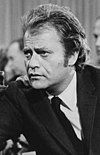



- February 1 – Basilio Lami Dozo, Argentine dictator (d. 2017)
- February 2 – Věra Chytilová, Czech director (d. 2014)
- February 5
- Hal Blaine, American drummer and session musician (d. 2019)
- Luc Ferrari, French composer (d. 2005)
- Fred Sinowatz, 18th Chancellor of Austria (d. 2008)
- February 6
- Sixten Jernberg, Swedish Olympic cross-country skier (d. 2012)
- Pierre Brice, French actor (d. 2015)
- February 10
- Hallgeir Brenden, Norwegian Olympic cross-country skier (d. 2007)
- Jerry Goldsmith, American composer and conductor (d. 2004)
- February 11 – Gunvor Pontén, Swedish actress (d. 2023)
- February 14 – Vic Morrow, American actor and director (d. 1982)[citation needed]
- February 15
- Graham Hill, English racing driver (d. 1975)[65]
- Kauko Armas Nieminen, Finnish physicist (d. 2010)
- Ibrahim Abu-Lughod, Palestinian academic (d. 2001)
- James Schlesinger, American politician (d. 2014)
- February 16 – Kazimierz Kutz, Polish film director and politician (d. 2018)
- February 17
- Paul Meger, Canadian ice hockey player (d. 2019)
- Alejandro Jodorowsky, Chilean-French director and screenwriter
- Patricia Routledge, English actress and singer
- February 18
- Roland Minson, American basketball player and coach (d. 2020)
- Len Deighton, British author
- February 21 – Chespirito (Roberto Gómez Bolaños), Mexican actor and comedian (d. 2014)
- February 22
- James Hong, Chinese American actor and director
- Miloš Radulović, President of Yugoslavia (d. 2017)
- Rebecca Schull, American actress
- Patriarch Alexy II of Russia (d. 2008)
- February 24
- Nils Petter Sundgren, Swedish film critic and television presenter (d. 2019)
- Zdzisław Beksiński, Polish surrealist painter (d. 2005)
- Hueyapan (d. 2010)
- February 26
- Ina'am Al-Mufti, Jordanian politician (d. 2018)
- Paolo Ferrari, Italian actor (d. 2018)
- February 27 – Rube Bjorkman, American ice hockey player and coach
- February 28
- Hayden Fry, American football player and coach (d. 2019)
- Frank Gehry, Canadian-born American architect
- Rangaswamy Srinivasan, Indian-American physical chemist and inventor
March

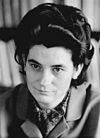
- March 1 – Georgi Markov, Bulgarian dissident (d. 1978)
- March 4
- Columba Domínguez, Mexican actress (d. 2014)
- Cyril Robinson, English footballer (d. 2019)
- Bernard Haitink, Dutch conductor (d. 2021)[66]
- March 6
- Fazil Iskander, Abkhaz writer (d. 2016)
- Ho Dam, North Korean politician (d. 1991)
- Günter Kunert, German writer (d. 2019)
- March 8 – Hebe Camargo, Brazilian television presenter, actress and singer (d. 2012)
- March 9
- Desmond Hoyte, 3rd Prime Minister of Guyana, 4th President of Guyana (d. 2002)
- Zillur Rahman, President of Bangladesh (d. 2013)
- March 10 – Lolita Rodrigues, Brazilian actress and presenter (d. 2023)
- March 13 – Paek Nam-sun, North Korean Minister of Foreign Affairs (d. 2007)
- March 15 – Cecil Taylor, African-American jazz pianist, composer, and poet (d. 2018)[67]
- March 16
- Gennady Bukharin, Soviet Olympic canoeist (d. 2020)
- Nadja Tiller, Austrian actress (d. 2023)
- March 18 – Christa Wolf, German literary critic, novelist, and essayist (d. 2011)[68]
- March 22
- Yayoi Kusama, Japanese contemporary artist
- P. Ramlee, Malaysian film actor, director, singer, songwriter, composer, and producer (d. 1973)
- March 23 – Sir Roger Bannister, British athlete (d. 2018)[69]
- March 29
- Richard Lewontin, American biologist, geneticist and academic (d. 2021)[70]
- Lennart Meri, President of Estonia (d. 2006)
- Olga Tass, Hungarian Olympic gymnast (d. 2020)
April




- April 1 – Milan Kundera, Czech writer (d. 2023)[71]
- April 3 – Poul Schlüter, Danish politician (d. 2021)[72]
- April 5
- Lucina da Costa Gomez-Matheeuws, Dutch Antillean politician (d. 2017)
- Ivar Giaever, Norwegian physicist and Nobel Prize laureate[73]
- Nigel Hawthorne, English actor (d. 2001)[74]
- Joe Meek, English record producer, sound engineer, and songwriter (d. 1967)
- April 6
- André Previn, German-American pianist, conductor and composer (d. 2019)[75]
- Christos Sartzetakis, Greek politician (d. 2022)
- April 7 – Madavoor Vasudevan Nair, Indian Kathakali dancer (d. 2018)
- April 8 – Jacques Brel, Belgian singer (d. 1978)
- April 9 – Fred Hollows, New Zealand-Australian ophthalmologist (d. 1993)
- April 10
- Duje Bonačić, Croatian rower (d. 2020)
- Mike Hawthorn, British racing driver (d. 1959)
- Max von Sydow, Swedish actor (d. 2020)
- April 13 – Yvonne Clark, American engineer (d. 2019)
- April 14
- Gerry Anderson, English television, film producer, director and writer, (Thunderbirds) (d. 2012)[76]
- Paavo Berglund, Finnish conductor, violinist (d. 2012)
- Chadli Bendjedid, 3rd President of Algeria (d. 2012)
- April 17 – James Last, German composer and bandleader (d. 2015)[77]
- April 21
- Estrella Zeledón Lizano, Costa Rican politician, First Lady (d. 2019)
- Bevin Hough, New Zealand sportsman (d. 2019)
- April 22
- Michael Atiyah, British-Lebanese mathematician (d. 2019)
- John Nicks, English figure skater and skating coach
- April 24
- April 25 – Abderrahmane Mahjoub, French and Moroccan international football (soccer) midfielder (d. 2011)
- April 26 – Alexandre Lamfalussy, Hungarian-Belgian economist and central banker (d. 2015)
- April 28 – Evangelina Elizondo, Mexican actress (d. 2017)
- April 30 – Klausjürgen Wussow, German actor (d. 2007)
May

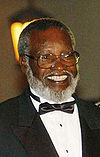

- May 1 – Ralf Dahrendorf, Anglo-German sociologist (d. 2009)[78]
- May 2
- Eddie Garcia, Filipino actor and director (d. 2019)
- Link Wray, American rock and roll musician (d. 2005)
- Édouard Balladur, 91st Prime Minister of France
- May 3 – Per-Ingvar Brånemark, Swedish physician, "father of modern dental implantology" (d. 2014)
- May 4
- Ronald Golias, Brazilian comedian and actor (d. 2005)
- Audrey Hepburn, Belgian-born British actress and activist (d. 1993)[79]
- May 5 – Ilene Woods, American singer, actress (d. 2010)
- May 6 – Paul Lauterbur, American chemist and Nobel laureate (d. 2007)[80]
- May 8
- Girija Devi, Indian classical singer (d. 2017)
- Miyoshi Umeki, Japanese singer, actress (d. 2007)
- May 12
- Ágnes Heller, Hungarian philosopher (d. 2019)
- Sam Nujoma, 1st President of Namibia
- Ângela Maria, Brazilian singer and actress (d. 2018)
- May 15 – Otar Patsatsia, Georgian politician (d. 2021)
- May 16
- Betty Carter, African-American jazz singer (d. 1998)
- Adrienne Rich, American poet and essayist (d. 2012)[81]
- May 25 – Beverly Sills, American operatic soprano, director of the New York City Opera (d. 2007)[82]
- May 29 – Peter Higgs, British theoretical physicist and Nobel Prize laureate[83] (d. 2024)
- May 30 – Doina Cornea, Romanian human rights activist, professor (d. 2018)
- May 31
- Joseph Bernardo, French Olympic swimmer (d. 2023)
- Menahem Golan, Israeli director and producer (d. 2014)
June


- June 3 – Werner Arber, Swiss microbiologist and Nobel laureate
- June 4
- Rolf Leeser, Dutch footballer and fashion designer (d. 2018)
- Karolos Papoulias, President of Greece (d. 2021)
- June 6
- Sunil Dutt, Hindi film actor (d. 2005)
- Albert Kalonji, Congolese politician (d. 2015)
- June 7 – John Turner, 17th Prime Minister of Canada (d. 2020)[84]
- June 8 – Gastone Moschin, Italian actor (d. 2017)
- June 10
- Ian Sinclair, Australian politician
- E. O. Wilson, American biologist[85] (d. 2021)
- James McDivitt, American astronaut (d. 2022)[86]
- June 12 – Anne Frank, German-born diarist, Holocaust victim (d. 1945)[87]
- June 13 – Kurt Equiluz, Austrian opera singer (d. 2022)[88]
- June 16 – Sabah Al-Ahmad Al-Jaber Al-Sabah, Emir of Kuwait (d. 2020)
- June 18 – Jürgen Habermas, German sociologist and philosopher[89]
- June 21 – Ramón Luis Rivera, Puerto Rican politician
- June 23
- June Carter Cash, American singer (d. 2003)
- Mario Ghella, Italian racing cyclist (d. 2020)
- Claude Goretta, Swiss television producer, film director (d. 2019)[90]
- June 24
- Carolyn S. Shoemaker, American astronomer[91] (d. 2021)
- Yaakov Agmon, Israeli theatre producer, manager, and director (d. 2020)
- June 25
- Eric Carle, American designer, illustrator, and writer (d. 2021)[92]
- Benny Schmidt, Danish modern pentathlete
- June 26 – Milton Glaser, American graphic designer, illustrator and teacher (d. 2020)[93]
- June 27
- H. Ian Macdonald, Canadian economist and civil servant
- Gennady Osipov, Russian scientist, sociologist and philosopher
- June 28 – Alfred Miodowicz, Polish politician (d. 2021)
- June 29
- Pete George, American weightlifter (d. 2021)
- Lalla Fatima Zohra, Moroccan aristocrat (d. 2014)
- June 30
- Othmar Mága, German conductor (d. 2020)
- Ron Phoenix, English footballer (d. 2021)
- Yang Ti-liang, Hong Kong judge (d. 2023)
July

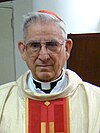




- July 1
- Gerald Edelman, American biologist and Nobel laureate (d. 2014)
- Jack Storey, Australian rules footballer
- July 2
- Daphne Hasenjäger, South African athlete
- Imelda Marcos, former First Lady of the Philippines
- July 5
- Akio Ōtsuka (d. 2015)
- Katherine Helmond, American actress (d. 2019)
- Thérèse Quentin, French actress (d. 2015)
- July 6 – Hélène Carrère d'Encausse, secretary of the Académie française, historian specializing in Russian history (d. 2023)
- July 7 – Sergio Romano, Italian writer, journalist, and historian
- July 9
- Elon Lages Lima, Brazilian mathematician (d. 2017)
- King Hassan II of Morocco (d. 1999)
- Chi Haotian, Chinese general
- July 10
- Franco Graziosi, Italian actor (d. 2021)
- José Vicente Rangel, Venezuelan politician (d. 2020)
- July 13 – Sofia Muratova, Soviet artistic gymnast (d. 2006)
- July 14
- Sonja Kastl, Croatian film and stage actress, teacher, dancer and choreographer
- Kailash Chandra Joshi, Indian politician (d. 2019)
- Syed Rahim, Indian cricketer (d. 2014)
- July 17
- Sergei K. Godunov, Russian mathematician, academic (d. 2023)
- Arthur Frommer, American writer, publisher and consumer advocate
- Vasco Modena, Italian racing cyclist (d. 2016)
- July 18
- Dick Button, American figure skater
- A V Swamy, Indian politician (d. 2019)
- July 19
- Emmanuel Le Roy Ladurie, French historian (d. 2023)
- Ronald Melzack, Canadian physiologist and professor (d. 2019)
- Orville Turnquest, Bahamian politician
- July 20 – Irving Wardle, English writer and theatre critic (d. 2023)
- July 21
- Birger Asplund, Swedish hammer thrower (d. 2023)
- Idrissa Dione, French boxer
- Albert Kwesi Ocran, Ghanaian soldier, politician (d. 2019)
- July 22 – Midhat J. Gazalé, French international telecommunications, space consultant (d. 2009)
- July 24
- Peter Yates, English film director and producer (d. 2011)
- Paolo Paoloni, Italian actor (d. 2019)
- July 25
- Vasily Shukshin, Russian actor, writer, screenwriter and film director (d. 1974)
- Somnath Chatterjee, Indian politician (d. 2018)[94]
- July 27
- Jean Baudrillard, French sociologist, philosopher, cultural theorist and political commentator (d. 2007)[95]
- Jack Higgins, British novelist (d. 2022)[96]
- July 28 – Jacqueline Kennedy Onassis, First Lady of the United States (d. 1994)[97]
- July 31 – Don Murray, American actor[98] (d. 2024)
August


- August 1
- Flerida Ruth Pineda-Romero, Filipino judge (d. 2017)
- Hafizullah Amin, Afghan politician and statesman (d. 1979)
- August 2 – José Afonso, Portuguese singer-songwriter, teacher and activist (d. 1987)[99]
- August 5
- Ottó Boros, Hungarian water polo player (d. 1988)
- Nathalia Timberg, Brazilian actress
- August 8
- Ronnie Biggs, British criminal (d. 2013)
- Luis García Meza, 57th president of Bolivia (d. 2018)
- August 15
- Carlo Ripa di Meana, Italian politician (d. 2018)
- Evelyn Y. Davis, American activist shareholder (d. 2018)[100]
- August 17 – Francis Gary Powers, American U-2 spy plane pilot (d. 1977)
- August 21 – Ahmed Kathrada, South African politician, political prisoner and anti-apartheid activist (d. 2017)
- August 23
- Zoltán Czibor, Hungarian footballer (d. 1997)
- Peter Thomson, Australian golfer (d. 2018)[101]
- August 24 – Yasser Arafat, Palestinian leader, Nobel laureate (d. 2004)
September
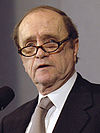


- September 1
- "Mad Dog" Vachon, Canadian professional wrestler (d. 2013)
- Květa Fialová, Czech actress (d. 2017)
- September 3
- Armand Vaillancourt, Québécois Canadian sculptor, painter and performance artist
- Irene Papas, Greek actress and singer (d. 2022)[102]
- September 5 – Bob Newhart, American comedian and actor[103]
- September 10 – Arnold Palmer, American golfer (d. 2016)[104]
- September 15
- John Julius Norwich, British historian, travel writer and television personality (d. 2018)[105]
- Murray Gell-Mann, American physicist and Nobel laureate (d. 2019)
- September 16
- Margarita Carrera, Guatemalan philosopher, professor and writer (d. 2018)
- Jamshid bin Abdullah, last Sultan of Zanzibar
- September 17 – Stirling Moss, British Formula One racing driver (d. 2020)[106]
- September 18 – Armando, Dutch artist (d. 2018)
- September 19 – Luigi Taveri, Swiss motorcycle road racer (d. 2018)
- September 20 – Anne Meara, American actress and comedian (d. 2015)[107]
- September 21
- Sándor Kocsis, Hungarian football player (d. 1979)
- Bernard Williams, English philosopher (d. 2003)[108]
- September 22
- Hédi Váradi, Hungarian actress (d. 1987)
- Carlo Ubbiali, Italian motorcycle road racer (d. 2020)
- September 23 – Johan Claassen, South African rugby player (d. 2019)
- September 24 – Tunku Abdul Malik, Raja Muda of Kedah (d. 2015)
- September 25
- Barbara Walters, American journalist (d. 2022)
- Ronnie Barker, English actor, comedian and writer (d. 2005)
- September 28
- Lata Mangeshkar, Indian singer (d. 2022)[109]
- Nikolai Ryzhkov, Soviet and Russian politician (d. 2024)[110]
- September 29 – Giorgio Bàrberi Squarotti, Italian academic, poet (d. 2017)
- September 30 – Mir Hazar Khan Khoso, Prime Minister of Pakistan (d. 2021)
October




- October 2 – Hong Song-nam, 8th Premier of North Korea (d. 2009)
- October 5
- Yuri Artsutanov, Russian engineer (d. 2019)
- Richard F. Gordon Jr., American astronaut (d. 2017)
- October 9 – Ana Luisa Peluffo, Mexican actress
- October 15
- Hubert Dreyfus, American philosopher (d. 2017)[111]
- Antonino Zichichi, Italian physicist
- October 16 – Fernanda Montenegro, Brazilian actress
- October 18 – Violeta Chamorro, President of Nicaragua
- October 21 – Ursula K. Le Guin, American science-fiction, fantasy author (d. 2018)[112]
- October 22
- Patsy Elsener, American diver (d. 2019)
- Lev Yashin, Russian footballer (d. 1990)
- October 24 – George Crumb, American composer (d. 2022)[113]
- October 25 – Claude Rouer, French Olympic road cyclist (d. 2021)
- October 26 – Yvonne Marie Louise Odette Renée Ménard, French burlesque dancer (d. 2013)[114]
- October 28 – Joan Plowright, English actress
- October 29 – Yevgeny Primakov, Russian politician, diplomat (d. 2015)
- October 31
- Bud Spencer, Italian actor (d. 2016)
- Muktha Srinivasan, Indian film director, producer (d. 2018)
November


- November 2
- Muhammad Rafiq Tarar, 9th president of Pakistan (d. 2022)
- Richard E. Taylor, Canadian-born physicist and Nobel laureate (d. 2018)
- November 5 – Lennart Johansson, Swedish sports official and 5th president of UEFA (d. 2019)
- November 6 – June Squibb, American actress[115]
- Eric R. Kandel, Austrian-born neuroscientist, Nobel laureate
- November 8 – Jona Senilagakali, Prime Minister of Fiji (d. 2011)
- November 9 – Imre Kertész, Hungarian writer, Nobel laureate (d. 2016)[116]
- November 10 – Ninón Sevilla, Cuban-born Mexican film actress, dancer (d. 2015)
- November 12
- Grace Kelly, American actress, later Princess of Monaco (d. 1982)
- Michael Ende, German fantasy writer (d. 1995)
- Hind Rostom, Egyptian actress (d. 2011)
- November 13 – Fred Phelps, American pastor, activist (Westboro Baptist Church) (d. 2014)
- November 15
- Ed Asner, American actor (d. 2021)
- Gombojavyn Ochirbat, Mongolian politician
- November 17 – Gorō Naya, Japanese actor, voice actor, narrator and theatre director, older brother of Rokurō Naya (d. 2013)
- November 18 – Francisco Savín, Mexican conductor, composer (d. 2018)
- November 20 – Raymond Lefèvre, French conductor, arranger, composer (d. 2008)
- November 23 – Karl Svoboda, Austrian politician (d. 2022)
- November 24 – Franciszek Kokot, Polish nephrologist (d. 2021)
- November 28
- Berry Gordy, African-American record producer, songwriter
- Thomas Remengesau Sr., 4th president of Palau (d. 2019)
- November 30 – Dick Clark, American television entertainer (d. 2012)
December



- December 1 – Alfred Moisiu, 7th president of Albania
- December 6
- Philippe Bouvard, French television and radio presenter
- Nikolaus Harnoncourt, Austrian conductor (d. 2016)
- Alain Tanner, Swiss film director (d. 2022)
- December 9
- Bob Hawke, 23rd Prime Minister of Australia (d. 2019)
- John Cassavetes, American actor and director (d. 1989)
- December 12 – Toshiko Akiyoshi, Japanese pianist and composer
- December 13 – Christopher Plummer, Canadian actor (d. 2021)
- December 15 – Dina bint Abdul-Hamid, queen consort of Jordan 1955–7 (d. 2019)
- December 16
- Nicholas Courtney, British actor (d. 2011)
- Arthur Fitzsimons, Irish football player, manager (d. 2018)
- December 17 – William Safire, American author, columnist, journalist and presidential speechwriter (d. 2009)
- December 19 – David Douglas, 12th Marquess of Queensberry, Scottish potter and aristocrat
- December 20
- Selim Hoss, 3-time prime minister of Lebanon
- Lee Hyun-jae, South Korean politician
- Milan Panić, Serbian politician
- December 22 – Wazir Mohammad Indian-Pakistani cricketer
- December 23
- Chet Baker, American jazz musician (d. 1988)[117]
- Monique Watteau, Belgian writer and artist
- December 24 – David H. DePatie, American film and television producer (d. 2021)
- December 26
- December 27 – Tommy Rall, American actor and dancer (d. 2020)
- December 28 – Efraín Goldenberg, Peruvian politician, finance minister and foreign relations minister
- December 29
- Susie Garrett, American actress (d. 2002)
- Matt "Guitar" Murphy, American blues musician (d. 2018)
- December 31 – Doug Anthony, 2nd Deputy Prime Minister of Australia (d. 2020)[119]
Date unknown
- Congolese politician and writer (d. 2001)[120]
Deaths
January
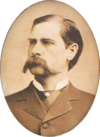

- January 5
- Marc McDermott, Australian-born American actor (b. 1881)
- Grand Duke Nicholas Nikolaevich of Russia (b. 1856)
- January 13 – Wyatt Earp, American gunfighter and sheriff (b. 1848)
- January 15 – Sir William Dawkins, British geologist and archaeologist (b. 1837)
- January 24 – Wilfred Baddeley, English tennis player (b. 1872)
- January 29 – Paul Gerson Unna, German dermatologist (b. 1850)[121]
- January 30
- Franklin J. Drake, American admiral (b. 1846)
- La Goulue, French dancer (b. 1866)
February

- José Gutiérrez Guerra, Bolivian economist and statesman, 28th President of Bolivia (b. 1869)
- February 6 – Maria Christina of Austria, Queen Regent of Spain (b. 1858)
- February 7 – Édouard Hugon, French philosopher, theologian (b. 1867)
- February 11 – Johann II, Prince of Liechtenstein (b. 1840)
- February 12 – Lillie Langtry, British singer, actress (b. 1853)
- February 14 – Thomas Burke, American Olympic athlete (b. 1875)
- February 18 – William Russell, American actor (b. 1884)
- February 24 – Frank Keenan, American actor (b. 1858)
- February 27 – Briton Hadden, co-founder of Time Magazine (b. 1898)
March

- Sir Edward Seymour, British admiral (b. 1840)
- March 5 – David Dunbar Buick, Scottish-American inventor (b. 1854)
- March 12 – Asa Griggs Candler, American businessman, politician (b. 1851)
- March 15 – Pinetop Smith, African-American blues pianist (b. 1904)
- Naval Governor of Guam (b. 1879)
- March 20 – Ferdinand Foch, French commander of Allied forces in World War I (b. 1851)
- March 22 – Inoue Yoshika, Japanese admiral (b. 1845)
- March 23 – Maurice Sarrail, French general (b. 1856)
- March 25 – Robert Ridgway, American ornithologist (b. 1850)
- March 29 – Sir Hugh John Macdonald, 8th premier of Manitoba (b. 1850)
April
- April 4
- Karl Benz, German automotive pioneer (b. 1844)
- William Michael Crose, United States Navy Commander, 7th Naval Governor of American Samoa (b. 1867)
- April 12 – Enrico Ferri, Italian criminologist (b. 1856)
- April 22 – Henry Lerolle, French painter (b. 1848)
- April 24 – Caroline Rémy de Guebhard, French feminist (b. 1855)
May
- May 2
- Segundo de Chomón, Spanish film director (b. 1871)
- Charalambos Tseroulis, Greek general (b. 1879)
- May 12 – Charles Swickard, German-American film director (b. 1861)
- May 13 – Arthur Scherbius, German electrical engineer, mathematician, cryptanalyst and inventor (b. 1878)
- May 21 – Archibald Primrose, 5th Earl of Rosebery, former Prime Minister of the United Kingdom (b. 1847)
- May 23 – John G. Jacobson, American businessman and politician (b. 1869)
- May 25 – Ernest Monis, 56th Prime Minister of France (b. 1846)
June
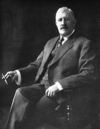
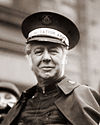
- June 5
- Adolph Coors, German-American brewer (b. 1847)[122]
- Sir Cecil Burney, British admiral of the fleet (b. 1858)
- June 9 – Alice Gossage, American journalist (b. 1861)
- June 8 – Bliss Carman, Canadian poet (b. 1861)
- June 11 – William D. Boyce, American entrepreneur, founder of the Boy Scouts of America (b. 1858)
- June 16 – Bramwell Booth, General of The Salvation Army (b. 1856)
- June 21 – Leonard Hobhouse, British political theorist, sociologist (b. 1864)
- June 24 – Queenie Newall, British Olympic archer (b. 1854)
- June 26 – Amandus Adamson, Estonian sculptor (b. 1855)
- June 28 – Edward Carpenter, English poet (b. 1844)
July

- July 2 – Gladys Brockwell, American actress (b. 1893)
- July 3 – Dustin Farnum, American actor (b. 1874)
- July 11 – Ali Ahmad Khan, Afghan politician, emir (b. 1883)
- July 12 – Robert Henri, American painter (b. 1865)
- July 15 – Hugo von Hofmannsthal, Austrian writer (b. 1874)
August

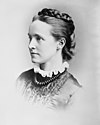

- August – Mary MacLane, Canadian feminist writer (b. 1881)
- August 3
- Emile Berliner, German-born inventor (b. 1851)
- Thorstein Veblen, Norwegian-American economist (b. 1857)
- August 4 – Carl Auer von Welsbach, Austrian chemist and inventor (b. 1858)[123]
- August 5 – Dame Millicent Fawcett, British suffragist, feminist (b. 1847)
- August 9 – Pierre Fatou, French mathematician (b. 1878)[124]
- August 10 – Aletta Jacobs, Dutch physician and women's suffrage activist (b. 1854)
- August 13 – Sir Ray Lankester, British zoologist (b. 1847)
- August 14 – Henry Horne, 1st Baron Horne, British general (b. 1861)
- August 19 – Sergei Diaghilev, Russian ballet impresario (b. 1872)
- August 22 – Otto Liman von Sanders, German general (b. 1855)
- Ernest Satow, British diplomat, scholar (b. 1843)
- August 27 – Herman Potočnik, Slovenian rocket engineer (b. 1892)
September

- September 2 – Paul Leni, German filmmaker (b. 1885)
- September 12 – Rainis, Latvian poet, playwright (b. 1865)
- September 23 – Richard Adolf Zsigmondy, Austrian-born chemist, Nobel Prize laureate (b. 1865)
- Rama IX (b. 1892)
- MLB Hall of Famer (b. 1879)
- September 27 – Johnny Hill, British, European, and World flyweight boxing champion (b. 1905)
- September 29 – Tanaka Giichi, 26th Prime Minister of Japan (b. 1864)
October
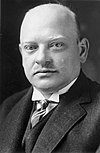

- October 1 – Antoine Bourdelle, French sculptor (b. 1861)
- October 3
- Jeanne Eagels, American actress (b. 1890)
- Gustav Stresemann, German statesman, 16th Chancellor of Germany, recipient of the Nobel Peace Prize (b. 1878)
- Syro-Malabar Catholic priest and venerable (b. 1876)
- October 20 – José Batlle y Ordóñez, 3-time President of Uruguay (b. 1856)
- October 21 – Vasil Radoslavov, 7th Prime Minister of Bulgaria (b. 1854)
- October 26 – Aby Warburg, German historian, cultural theorist (b. 1866)
- October 27
- Georg von der Marwitz, German general (b. 1856)
- Théodore Tuffier, French surgeon (b. 1857)
- Chancellor of Germany (b. 1849)
- October 29 – Emily Robin, English Madame (b. 1874)
- October 31 – António José de Almeida, Portuguese political figure, 64th Prime Minister of Portugal and 6th President of Portugal (b. 1866)
November

- Emir of Afghanistan (b. 1891)
- November 6 – Prince Maximilian of Baden, Chancellor of Germany (b. 1867)
- MLB Hall of Famer (b. 1871)
- November 15 – Léon Delacroix, former Prime Minister of Belgium (b. 1867)
- November 17 – Herman Hollerith, American businessman, inventor (b. 1860)
- November 24
- Georges Clemenceau, Prime Minister of France, leader of the World War I (b. 1841)
- Raymond Hitchcock, American actor (b. 1865)
- Chandra Shumsher Jang Bahadur Rana, 13th Prime Minister of Nepal (b. 1863)
December


- December 10
- Chief Inspector of the London Metropolitan Police, investigator in the Jack the Ripper murders (b. 1843)
- Harry Crosby, American publisher, poet (b. 1898)
- December 14 – Henry B. Jackson, British admiral (b. 1855)
- December 17
- Manuel Gomes da Costa, Portuguese general, politician and 10th President of Portugal (b. 1863)
- Arthur G. Jones-Williams, British aviator (b. 1898)
- December 20 – Émile Loubet, French politician, 8th President of France (b. 1838)
- December 21 – I. L. Patterson, American politician, 18th Governor of Oregon (b. 1859)
- December 29 – Wilhelm Maybach, German automobile designer (b. 1846)
Nobel Prizes
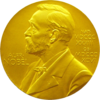
- Physics – Louis de Broglie
- Hans Karl August Simon von Euler-Chelpin
- Physiology or Medicine – Christiaan Eijkman, Sir Frederick Gowland Hopkins
- Literature – Thomas Mann
- Frank Billings Kellogg
References
- ISBN 0-8050-4848-0.
- ^ Stannard, Matthew B. (August 9, 2005). "A Time of Change; Israelis, Palestinians and the Disengagement". San Francisco Chronicle.
- ^ NA 59/8/353/84/867n, 404 Wailing Wall/279 and 280, Archdale Diary and Palestinian Police records.
- ISBN 0-8133-4019-5
- ISBN 0-521-59692-0
- ISBN 0-7656-0712-3
- ISBN 0-7656-0143-5
- ISBN 0-521-66371-7
- ^ ISBN 982-02-0029-6.
- ^ a b Pauley, Bruce F. (2003). Hitler, Stalin, and Mussolini: Totalitarianism in the Twentieth Century. Wheeling: Harlan Davidson. p. 117.
- ISBN 0-8133-4176-0.
- ISBN 0-618-22442-4.
- ISBN 0-521-02366-1.
- ISBN 0-435-30920-X.
- ISBN 0-380-71393-4
- ^ "Treaties, States parties, and Commentaries - Geneva Convention on Prisoners of War, 1929". www.icrc.org.
- ISBN 0-19-927247-6.
- ISBN 0-333-77224-5.
- ISBN 0-313-31272-9.
- ISBN 0-521-35854-X.
- ISBN 0-19-822114-2.
- ISBN 0-299-16564-7.
- ISBN 0-7146-5050-1
- ISBN 0-8223-1066-X
- ISBN 1-57607-084-0
- ^ Gilbert, 761–2
- ISBN 0-521-64701-0
- ISBN 0-8018-8038-6
- ^ ISSN 0024-5089
- ISBN 0-19-829200-7
- ISBN 1-85728-595-6
- ISBN 1-894004-76-0.
- ^ a b Ruffman, Alan (1997), The 1929 Tsunami In St. Lawrence, Newfoundland (PDF), Ottawa: Office of Critical Infrastructure Protection and Emergency Preparedness, archived from the original (PDF) on January 13, 2013, retrieved February 26, 2013
- ISBN 0-275-95736-5pp. 18–23
- ISBN 1-57488-452-2; pp. 32–33
- ^ Gilbert, 767–9
- ^ Hoover, Herbert. "Annual Message to Congress on the State of the Union". The American Presidency Project. Retrieved February 26, 2013.
- ^ Gilbert, pp. 769–70
- ^ "Popeye the Sailor". Don Markstein's Toonopedia. Retrieved September 22, 2011.
- ^ ISBN 90-286-2621-2.
- ^ "Saint Valentine's Day Massacre". Encyclopaedia Britannica. February 7, 2020. Retrieved March 28, 2020.
- ^ Fuller, Joseph V. (1943). Papers Relating to the Foreign Relations of the United States, 1929. Vol. II. Washington, D.C.: United States Government Publishing Office. p. 143.
- ^ "1929 Inauguration". Herbert Hoover Presidential Library and Museum timeline. December 6, 2017. Retrieved March 28, 2020.
- ^ Secretariat for Migration Affairs (March 4, 2014). "4 DE MARZO DE 1929. FUNDACIÓN DEL PARTIDO NACIONAL REVOLUCIONARIO" [March 4, 1929. Foundation of the National Revolutionary Party]. migrantes.pri.org (in Spanish). Retrieved March 28, 2020.
- ISBN 0-14-102715-0.
- ISBN 1-85986-000-1.
- ^ Erkki Laitinen: Kurun historia 1919–1985. Vanhan Ruoveden historia III: 52, p. 272. Kurun kunta, 1992. (in Finnish)
- ^ Orvo Kärkönen: Näsijärven murhenäytelmä 7.IX.1929. Otto Andersinin kustannusliike, 1929. (in Finnish)
- ISBN 9781558761551.
- ^ KIMBERLY AMADEO (March 17, 2020). "Stock Market Crash of 1929 Facts, Causes, and Impact". The Balance. Retrieved March 28, 2020.
- ISBN 978-0-86840-838-5.
- ^ "Edwin S. Lowe, 75; Toy Manufacturer Popularized Bingo". The New York Times. February 25, 1986. Retrieved December 1, 2019.
- ^ Clarence-Smith, W. (2020). Islam and the Abolition of Slavery. USA: Hurst.
- ISBN 978-0-7864-0592-3.
- ^ Evans, Hilary; Gjerde, Arild; Heijmans, Jeroen; Mallon, Bill; et al. "Latif-ur Rehman". Olympics at Sports-Reference.com. Sports Reference LLC. Archived from the original on December 3, 2016.
- ISBN 978-1-57958-390-3.
- ISBN 978-1-884964-47-3.
- ^ Radio Free Europe Research. RFE/RL. 1987. p. 3.
- ^ Cleveland Amory (1959). International Celebrity Register. Celebrity Register. p. 529.
- ^ "Saeed Jaffrey, actor – obituary". The Telegraph. November 16, 2015. Retrieved November 16, 2015.
- ISBN 978-1-84468-726-8.
- ISBN 978-0-237-52816-4.
- ISBN 9781770706477.
- ISBN 978-0-9615476-0-8.
- ISBN 9780717275274.
- ISSN 0362-4331. Retrieved October 22, 2021.
- ISBN 9780195320008.
- ^ Christa Wolf obituary, Kate Webb, The Guardian, 1 December 2011
- ISBN 978-1-134-28136-7.
- ^ Angier, Natalie (July 7, 2021). "Richard C. Lewontin, Eminent Geneticist With a Sharp Pen, Dies at 92". The New York Times. Retrieved July 8, 2021.
- ISBN 9781438113340.
- ISBN 9780313286230.
- ISBN 978-0-684-86315-3.
- ISBN 978-1-902806-31-0.
- ISBN 9781403939104.
- ISBN 978-0-563-53481-5.
- ^ Billboard. Nielsen Business Media, Inc. May 19, 1973. p. 38.
- ISBN 978-0-415-10923-9.
- ISBN 978-0-86369-741-8.
- ISBN 978-3-540-26988-5.
- ^ "Poet and pioneer". Guardian. June 15, 2002. Retrieved August 14, 2021.
- ISBN 978-0-313-30376-0.
- ISBN 978-0-85112-868-9.
- ^ "John Turner, PM and Liberal leader who battled free trade with U.S., dead at 91". CBC. Retrieved August 14, 2021.
- ISBN 9780309102377.
- ^ "Correction: Apollo Astronaut James McDivitt Dies at Age 93". NASA. October 17, 2022. Retrieved October 17, 2022.
- ^ "BBC - The Diary of Anne Frank - Anne's Timeline". www.bbc.co.uk. Retrieved June 25, 2020.
- ^ "Kurt Equiluz (Tenor) - Short Biography". www.bach-cantatas.com.
- ISBN 9780415108294.
- ^ "Mort du cinéaste suisse Claude Goretta". Le Monde. February 21, 2019. Retrieved February 21, 2019.
- ISBN 9781412976855. Retrieved June 22, 2018.
- ^ "Eric Carle, Author and Illustrator of 'The Very Hungry Caterpillar,' Dead at 91". Rolling Stone. May 27, 2021. Retrieved May 27, 2021.
- ISBN 978-3-85932-135-9.
- ^ "Former Lok Sabha Speaker and veteran Communist leader Somnath Chatterjee passes away at the age of 89". Jayatri Nag. Mumbai Mirror. August 13, 2018. Retrieved August 14, 2018.
- ^ Poole, Steven (March 7, 2007). "Jean Baudrillard. Philosopher and sociologist who blurred the boundaries between reality and simulation". The Guardian. London, England.
- ^ Ripley, Mike (April 10, 2022). "Jack Higgins obituary". The Guardian. Retrieved April 10, 2022.
- ISBN 978-0-312-30281-8. Page 64
- ISBN 978-1-55783-551-2. Retrieved June 29, 2011.
- ^ "O homem que cantou a liberdade morreu há 30 anos". www.jn.pt (in Portuguese). Retrieved April 10, 2021.
- ISSN 0362-4331. Retrieved July 18, 2022.
- ^ Mason, Peter (June 20, 2018). "Peter Thomson obituary". The Guardian. Retrieved June 20, 2018.
- ^ Zee, Michaela (September 14, 2022). "Irene Papas, 'Zorba The Greek' and 'Z' Star, Dies at 93". Variety. Retrieved September 21, 2022.
- ISBN 9781641433167.
- ISBN 9781641432641.
- ^ Telegraph Obituaries (June 1, 2018). "John Julius Norwich, writer and television personality – obituary". The Telegraph. Telegraph.co.uk. Archived from the original on January 12, 2022. Retrieved March 13, 2020.
- ^ The Autocar: A Journal Published in the Interests of the Mechanically Propelled Road Carriage. Iliffe, sons & Sturmey Limited. 1987. p. 4.
- ^ "E.J. Meara, Creator Of Comedy Skits, 73". The New York Times. December 16, 1966. Archived from the original on November 6, 2012.
- ^ Christopher Lehmann-Haupt (June 14, 2003). "Sir Bernard Williams, 73, Oxford Philosopher, Dies". The New York Times. Retrieved April 11, 2022.
- ISBN 978-81-7476-023-4.
- ^ "Nikolaj Ivanovič Ryzhkov". Archontology. Retrieved April 1, 2013.
- ISSN 0362-4331. Retrieved April 15, 2019.
- ^ Jonas, Gerald (January 23, 2018). "Ursula K. Le Guin, Acclaimed for Her Fantasy Fiction, Is Dead at 88". The New York Times. Archived from the original on January 23, 2018. Retrieved January 23, 2018.
- ^ Schweitzer, Vivien (February 6, 2022). "George Crumb, Eclectic Composer Who Searched for Sounds, Dies at 92". The New York Times. Retrieved February 7, 2022.
- ^ "Fichier des personnes décédées - MENARD Yvonne Marie Louise Odette Renee | Chelun 26/10/1929 - Pléchâtel 05/01/2013" [File of deceased persons - MENARD Yvonne Marie Louise Odette Renee | Chelun 26/10/1929 - Pléchâtel 05/01/2013]. matchID - Moteur de recherche des décès (in French). 2013. Retrieved February 22, 2024.
- ^ "Oldest/youngest acting nominees and winners". Academy of Motion Picture Arts and Sciences. p. 2.10–8. Retrieved January 25, 2022.
- ^ George Gomori (March 31, 2016). "Imre Kertész obituary". The Guardian. Retrieved April 1, 2016.
- ^ Pareles, Jon (May 14, 1988). "Chet Baker, Jazz Trumpeter, Dies at 59 in a Fall". The New York Times. Retrieved March 25, 2016.
- ^ Kim Willsher (May 8, 2022). "Régine Zylberberg obituary". The Guardian. Retrieved March 1, 2024.
- ^ Guardian Staff (December 20, 2020). "Doug Anthony, former Nationals leader and deputy prime minister, dies aged 90". The Guardian. Retrieved April 20, 2021.
- ^ "Afrology Littérature". Archived from the original on August 29, 2008. Retrieved December 3, 2009.
- PMID 5335585.
- ^ Rich Griset, "Strange Brew", Coastal Virginia Magazine, January 2015
- ISBN 978-0-387-95179-9.
- ^ "Pierre Fatou - Biography". Maths History.
Sources
- The 1930s Timeline: 1929 – from American Studies Programs at The University of Virginia
